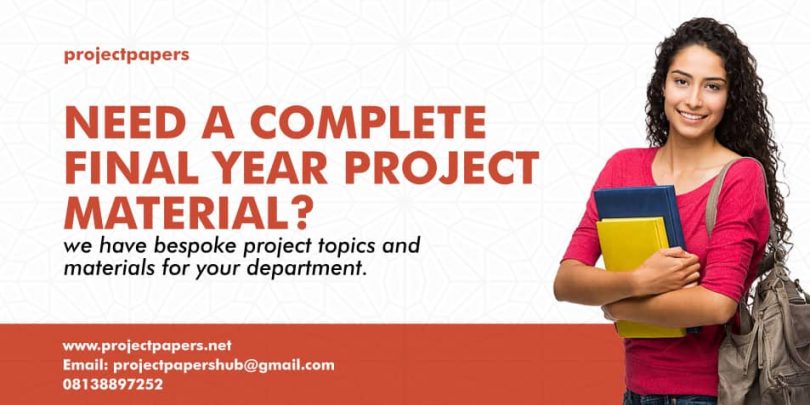Advertisements
The Impact of Planning on Teaching and Curriculum Development of Teaching and Learning Integrated Science in Junior Secondary Schools in Nigeria
Content Structure of The Impact of Planning on Teaching and Curriculum Development of Teaching and Learning Integrated Science in Junior Secondary Schools in Nigeria
- The abstract contains the research problem, the objectives, methodology, results, and recommendations
- Chapter one of this thesis or project materials contains the background to the study, the research problem, the research questions, research objectives, research hypotheses, significance of the study, the scope of the study, organization of the study, and the operational definition of terms.
- Chapter two contains relevant literature on the issue under investigation. The chapter is divided into five parts which are the conceptual review, theoretical review, empirical review, conceptual framework, and gaps in research
- Chapter three contains the research design, study area, population, sample size and sampling technique, validity, reliability, source of data, operationalization of variables, research models, and data analysis method
- Chapter four contains the data analysis and the discussion of the findings
- Chapter five contains the summary of findings, conclusions, recommendations, contributions to knowledge, and recommendations for further studies.
- References: The references are in APA
- Questionnaire.
Chapter One of The Impact of Planning on Teaching and Curriculum Development of Teaching and Learning Integrated Science in Junior Secondary Schools in Nigeria
Nigerian Educational System has gone through various developments and changes viz-a-viz curriculum issues. The dynamic nature of the curriculum process informs the concept of effective planning of integrated science curriculum in secondary schools.
This is so because science education plays a vital role in the lives of individuals and the development of a nation scientifically and technologically (Aleboisu and Ifamuyiwa, 2008). It is widely and generally acknowledged that the gateway to the survival of a nation scientifically and technologically is scientific literacy which can only be achieved through science education. This starts from giving students a good foundation in integrated science from junior secondary level.
But government in this direction can not be said to have yielded much fruits given the dwindling nature of student’s performance in integrated science in junior secondary school and the low rate of students offering science in senior secondary school as well as their performance in core science subjects.
Disturbed by this ugly development, researchers in the field of science education in Nigeria embarked on series of studies to find the logic behind this ugly development. They found that the problem stemmed from the first form of science a child comes across at the junior secondary school level that is integrated science. Integrated science provide students sound basis for further science education study, hence a child that is not well grounded in integrated science at this level would not show interest in offering core science subject (Biology, Chemistry and Physics) at Senior Secondary Schol level which are pre-requisites for studying science oriented courses at the Nation’s tertiary institutions.
They also found that lack of qualified teachers, lack of practical work as well as lack of equipments and facilities for teaching, insufficient allotment of time for integrated science on the school time table and poor methods of teaching are the major factors militating against the successive implementation of the core curriculum in integrated science (Ajuwape and Olatoye, 2004).
It is against this background that the researcher seeks to investigate the subject matter of this research: The impact of effective planning and curriculum development on teaching and learning of integrated science in secondary school.
Advertisements
Statement of Problem
Integrated Science have been taught in Junior Secondary Schools since 1972 in order to inculcate science knowledge and encourage students to offer science subjects in Senior Secondary School (Ifamuyiwa, 2008).
But inspite of this, government effort cannot be said to have yielded much fruits given the dwindling nature of students’ performance in integrated science which has a negative effect on the future performance of those offering core science and consequently poor performance inc ore subjects in WAEC and NECO examination which are prerequisites for studying in the Nation’s tertiary institutions. This has been attributed to myriad of problems ranging from lack of qualified teachers, lack of equipments and facilities for teaching, lack of practical works, insufficient allotment of time for integrated science on the school time table and poor teaching methods.
Advertisements


